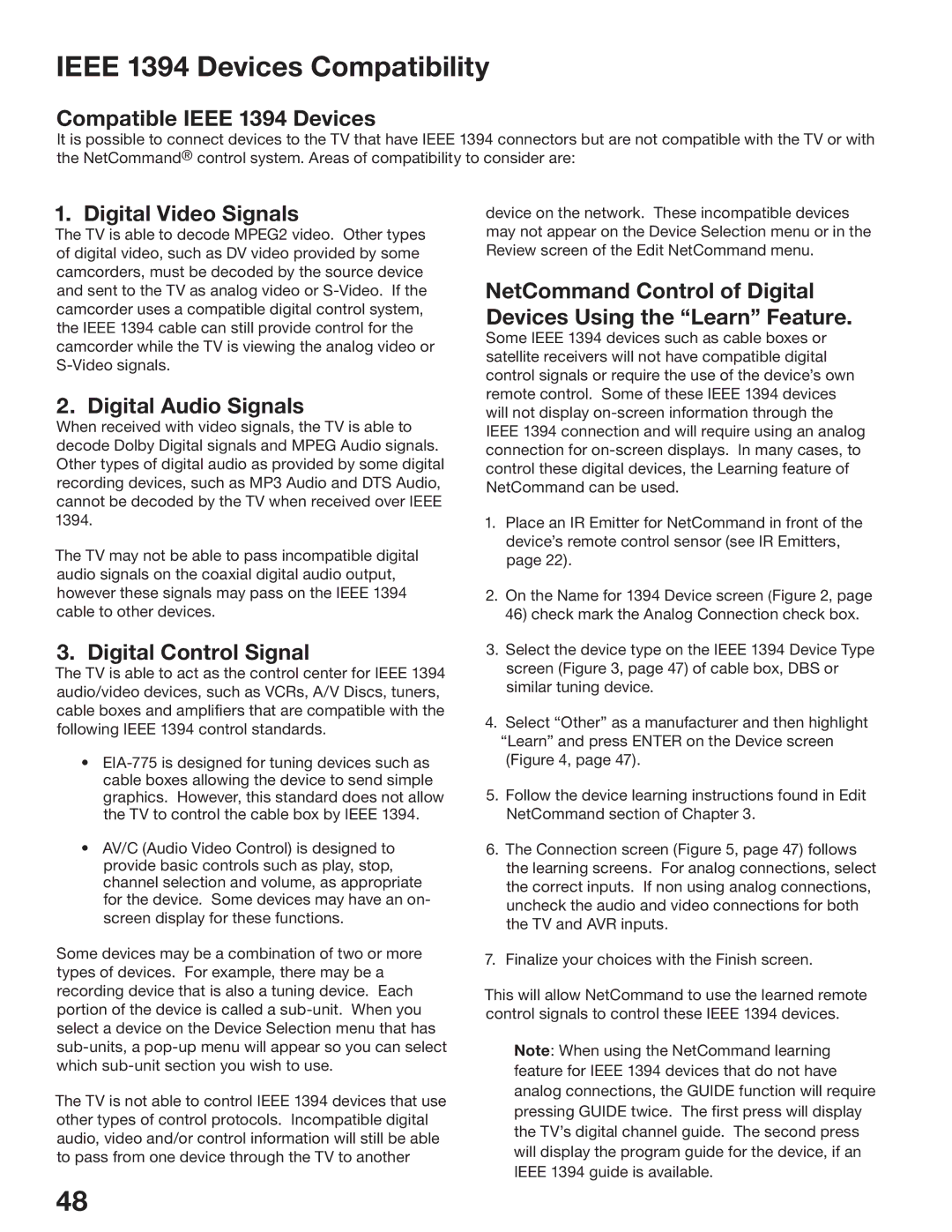IEEE 1394 Devices Compatibility
Compatible IEEE 1394 Devices
It is possible to connect devices to the TV that have IEEE 1394 connectors but are not compatible with the TV or with the NetCommand® control system. Areas of compatibility to consider are:
1. Digital Video Signals
The TV is able to decode MPEG2 video. Other types of digital video, such as DV video provided by some camcorders, must be decoded by the source device and sent to the TV as analog video or
2. Digital Audio Signals
When received with video signals, the TV is able to decode Dolby Digital signals and MPEG Audio signals. Other types of digital audio as provided by some digital recording devices, such as MP3 Audio and DTS Audio, cannot be decoded by the TV when received over IEEE 1394.
The TV may not be able to pass incompatible digital audio signals on the coaxial digital audio output, however these signals may pass on the IEEE 1394 cable to other devices.
3. Digital Control Signal
The TV is able to act as the control center for IEEE 1394 audio/video devices, such as VCRs, A/V Discs, tuners, cable boxes and amplifiers that are compatible with the following IEEE 1394 control standards.
•
•AV/C (Audio Video Control) is designed to provide basic controls such as play, stop, channel selection and volume, as appropriate for the device. Some devices may have an on- screen display for these functions.
Some devices may be a combination of two or more types of devices. For example, there may be a recording device that is also a tuning device. Each portion of the device is called a
The TV is not able to control IEEE 1394 devices that use other types of control protocols. Incompatible digital audio, video and/or control information will still be able to pass from one device through the TV to another
device on the network. These incompatible devices may not appear on the Device Selection menu or in the Review screen of the Edit NetCommand menu.
NetCommand Control of Digital Devices Using the “Learn” Feature.
Some IEEE 1394 devices such as cable boxes or satellite receivers will not have compatible digital control signals or require the use of the device’s own remote control. Some of these IEEE 1394 devices will not display
1.Place an IR Emitter for NetCommand in front of the device’s remote control sensor (see IR Emitters, page 22).
2.On the Name for 1394 Device screen (Figure 2, page
46)check mark the Analog Connection check box.
3.Select the device type on the IEEE 1394 Device Type screen (Figure 3, page 47) of cable box, DBS or similar tuning device.
4.Select “Other” as a manufacturer and then highlight “Learn” and press ENTER on the Device screen (Figure 4, page 47).
5.Follow the device learning instructions found in Edit NetCommand section of Chapter 3.
6.The Connection screen (Figure 5, page 47) follows the learning screens. For analog connections, select the correct inputs. If non using analog connections, uncheck the audio and video connections for both the TV and AVR inputs.
7. Finalize your choices with the Finish screen.
This will allow NetCommand to use the learned remote control signals to control these IEEE 1394 devices.
Note: When using the NetCommand learning feature for IEEE 1394 devices that do not have analog connections, the GUIDE function will require pressing GUIDE twice. The first press will display the TV’s digital channel guide. The second press will display the program guide for the device, if an IEEE 1394 guide is available.
48
